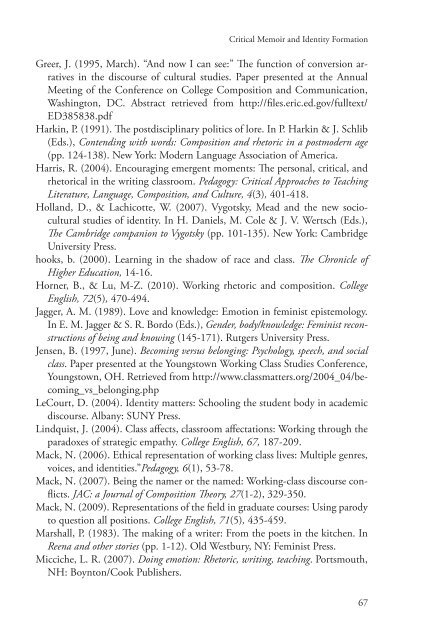Critical Expressivism- Theory and Practice in the Composition Classroom, 2014a
Critical Expressivism- Theory and Practice in the Composition Classroom, 2014a
Critical Expressivism- Theory and Practice in the Composition Classroom, 2014a
You also want an ePaper? Increase the reach of your titles
YUMPU automatically turns print PDFs into web optimized ePapers that Google loves.
<strong>Critical</strong> Memoir <strong>and</strong> Identity Formation<br />
Greer, J. (1995, March). “And now I can see:” The function of conversion arratives<br />
<strong>in</strong> <strong>the</strong> discourse of cultural studies. Paper presented at <strong>the</strong> Annual<br />
Meet<strong>in</strong>g of <strong>the</strong> Conference on College <strong>Composition</strong> <strong>and</strong> Communication,<br />
Wash<strong>in</strong>gton, DC. Abstract retrieved from http://files.eric.ed.gov/fulltext/<br />
ED385838.pdf<br />
Hark<strong>in</strong>, P. (1991). The postdiscipl<strong>in</strong>ary politics of lore. In P. Hark<strong>in</strong> & J. Schlib<br />
(Eds.), Contend<strong>in</strong>g with words: <strong>Composition</strong> <strong>and</strong> rhetoric <strong>in</strong> a postmodern age<br />
(pp. 124-138). New York: Modern Language Association of America.<br />
Harris, R. (2004). Encourag<strong>in</strong>g emergent moments: The personal, critical, <strong>and</strong><br />
rhetorical <strong>in</strong> <strong>the</strong> writ<strong>in</strong>g classroom. Pedagogy: <strong>Critical</strong> Approaches to Teach<strong>in</strong>g<br />
Literature, Language, <strong>Composition</strong>, <strong>and</strong> Culture, 4(3), 401-418.<br />
Holl<strong>and</strong>, D., & Lachicotte, W. (2007). Vygotsky, Mead <strong>and</strong> <strong>the</strong> new sociocultural<br />
studies of identity. In H. Daniels, M. Cole & J. V. Wertsch (Eds.),<br />
The Cambridge companion to Vygotsky (pp. 101-135). New York: Cambridge<br />
University Press.<br />
hooks, b. (2000). Learn<strong>in</strong>g <strong>in</strong> <strong>the</strong> shadow of race <strong>and</strong> class. The Chronicle of<br />
Higher Education, 14-16.<br />
Horner, B., & Lu, M-Z. (2010). Work<strong>in</strong>g rhetoric <strong>and</strong> composition. College<br />
English, 72(5), 470-494.<br />
Jagger, A. M. (1989). Love <strong>and</strong> knowledge: Emotion <strong>in</strong> fem<strong>in</strong>ist epistemology.<br />
In E. M. Jagger & S. R. Bordo (Eds.), Gender, body/knowledge: Fem<strong>in</strong>ist reconstructions<br />
of be<strong>in</strong>g <strong>and</strong> know<strong>in</strong>g (145-171). Rutgers University Press.<br />
Jensen, B. (1997, June). Becom<strong>in</strong>g versus belong<strong>in</strong>g: Psychology, speech, <strong>and</strong> social<br />
class. Paper presented at <strong>the</strong> Youngstown Work<strong>in</strong>g Class Studies Conference,<br />
Youngstown, OH. Retrieved from http://www.classmatters.org/2004_04/becom<strong>in</strong>g_vs_belong<strong>in</strong>g.php<br />
LeCourt, D. (2004). Identity matters: School<strong>in</strong>g <strong>the</strong> student body <strong>in</strong> academic<br />
discourse. Albany: SUNY Press.<br />
L<strong>in</strong>dquist, J. (2004). Class affects, classroom affectations: Work<strong>in</strong>g through <strong>the</strong><br />
paradoxes of strategic empathy. College English, 67, 187-209.<br />
Mack, N. (2006). Ethical representation of work<strong>in</strong>g class lives: Multiple genres,<br />
voices, <strong>and</strong> identities.”Pedagogy, 6(1), 53-78.<br />
Mack, N. (2007). Be<strong>in</strong>g <strong>the</strong> namer or <strong>the</strong> named: Work<strong>in</strong>g-class discourse conflicts.<br />
JAC: a Journal of <strong>Composition</strong> <strong>Theory</strong>, 27(1-2), 329-350.<br />
Mack, N. (2009). Representations of <strong>the</strong> field <strong>in</strong> graduate courses: Us<strong>in</strong>g parody<br />
to question all positions. College English, 71(5), 435-459.<br />
Marshall, P. (1983). The mak<strong>in</strong>g of a writer: From <strong>the</strong> poets <strong>in</strong> <strong>the</strong> kitchen. In<br />
Reena <strong>and</strong> o<strong>the</strong>r stories (pp. 1-12). Old Westbury, NY: Fem<strong>in</strong>ist Press.<br />
Micciche, L. R. (2007). Do<strong>in</strong>g emotion: Rhetoric, writ<strong>in</strong>g, teach<strong>in</strong>g. Portsmouth,<br />
NH: Boynton/Cook Publishers.<br />
67


















